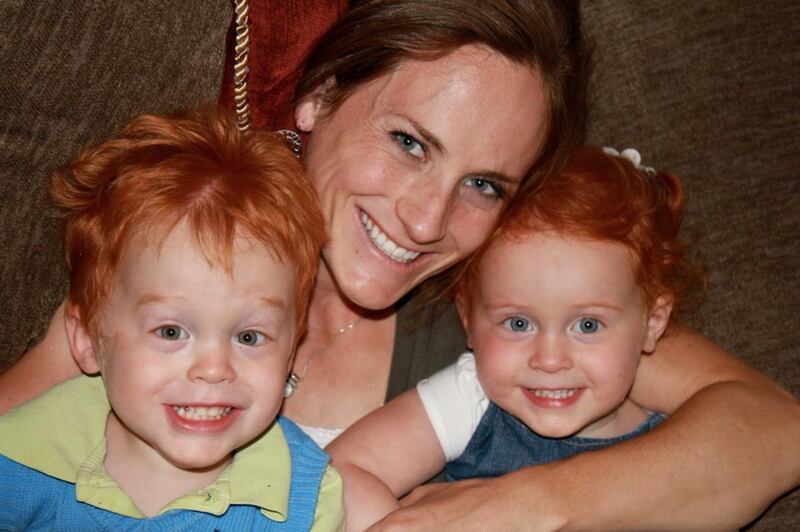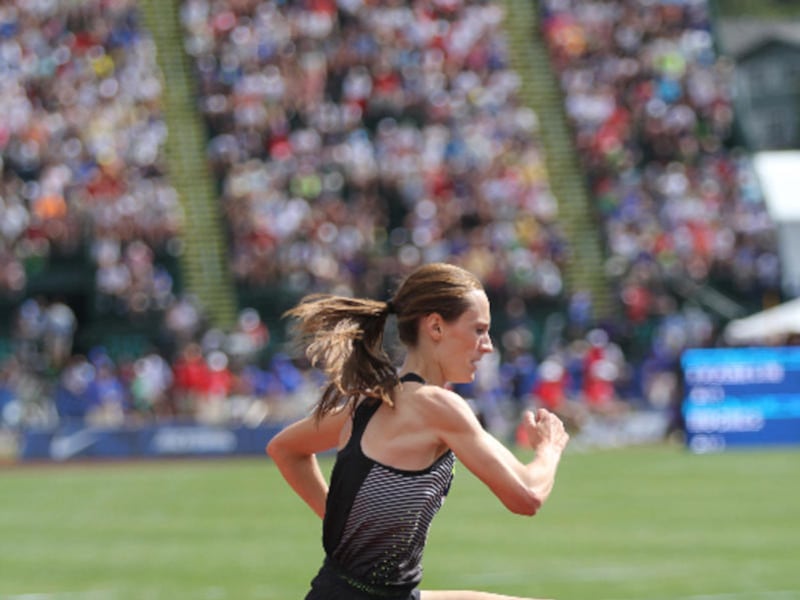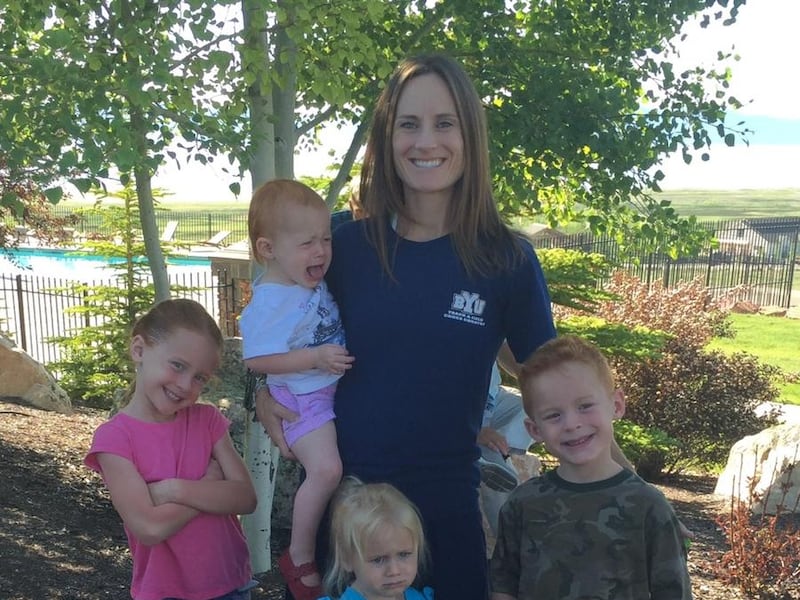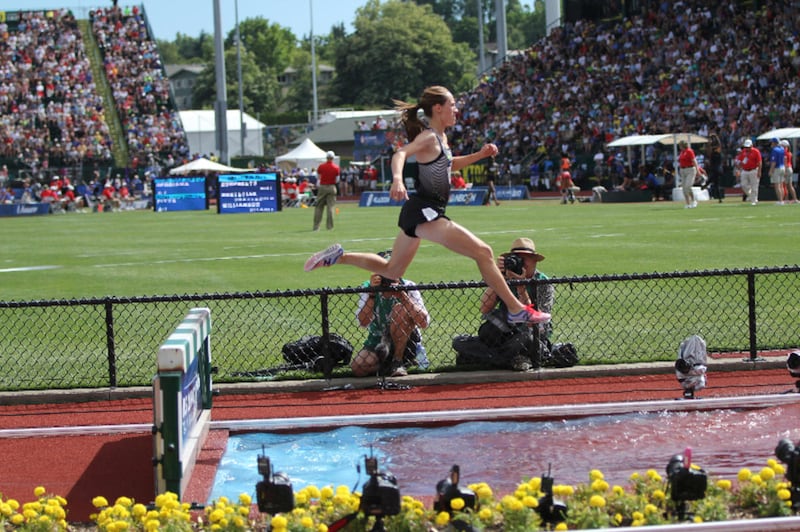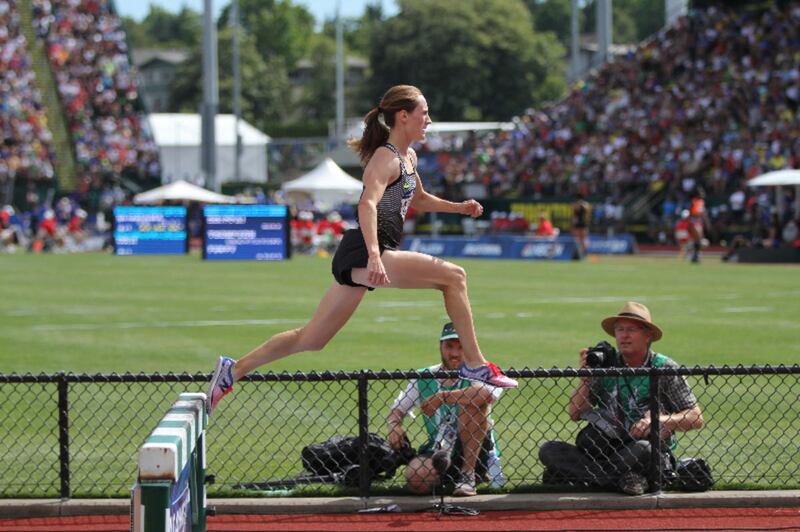I can’t be disappointed,” she says now, looking back. “My dad gave me a (LDS Church) blessing in which he said you’ll know you gave it everything you had. I did know I gave it everything. There was not moment I could look back and say I could’ve run faster. I ran my guts out. – Rena Williams Chesser
It’s only July but I already have my nomination for Utah Sportswoman of the Year: Rena Williams Chesser.
Who?
She’s a single mother of four, 33 years old. She is in the midst of tragic family upheaval that will result in divorce after 12 years of marriage. A former BYU All-American distance runner, she lives in tiny Beaver, Utah – where she grew up -- and trains by herself at the local high school track. She drives to California by herself to find races. Her weekly recovery run consists of pushing her twins in a stroller for six miles, which is as far as her kids can endure the tedium. She had a stress fracture that limited her training to running in a pool for a couple of months.
In short, she’s had more obstacles thrown in her path than she faces in the 3,000-meter steeplechase, which is her specialty. And yet somehow she managed not only to qualify for the U.S. Olympic Trials in Eugene, Ore., she made the final and placed 10th, running 12 seconds – TWELVE SECONDS – faster than she had run in her life.
If that doesn’t impress you, consider this: The other women in the race were professionals; they have shoe deals. They are fulltime runners. Rena has no sponsorships. She runs part-time for fun, for catharsis, for sport, for her family, for her hometown, which watched her race on a big-screen TV in the local high school auditorium and threw her a post-race parade.
Rena didn’t qualify for the Olympic team, but she achieved her dream of running in the Olympic Trials, which is why she cried uncontrollably the first time she walked into legendary Hayward Field to run the semifinals. She had tried two other times to qualify for the Trials and had failed by the slimmest of margins in 2008 and 2012. And yet this time, when things couldn’t be much worse, when tragic circumstances and the arrest of her husband forced her to raise four children alone, and she returned to her hometown and her family for support and a new start – now, of all times, she ran the races of her life. She considers this a tender mercy.
“I’m going through a really difficult time in my life,” she says. “In 2012, I was in great shape, but it was almost like God was saying, I’m going to bless you with this, but now (2012) is not the right time. I really needed this in my life right now because I’m going through the hardest time in my life.”
The path to the Olympic Trials, which were held early this month, really began in 2003. That was the year she walked-on at BYU. A seven-time state champion at Beaver High in track and cross country, she tried the steeplechase for the first time that year and, as she puts it, “I was horrible.” She was a lousy hurdler and even worse with the water jump, which she landed on two feet, costing herself momentum and energy. She was so bad that her coach refused to send her to a steeplechase camp with her teammates.
She was urged to give up the event, but she enjoyed the challenge and strategy of the hurdles and barriers, and deep down she was convinced she could excel in the steeplechase. She had a dream one night in which she hurdled with her opposite leg – jumping with her right leg instead of her left -- and the next day she tried it and finished third in the 2004 NCAA championships to end her junior year. That cured her hurdle issues. She became a polished technician and eventually learned to hurdle with either leg. A year later she was struck by mono and managed only a 12th-place finish in the NCAA championships, leaving her wanting more.
When she graduated that spring her best time was a modest 10:02.21. It would take seven years just to break the 10-minute mark.
She married one of her teammates. He became a dentist and a captain in the Air Force. They lived in Virginia for four years, Ohio one year, Japan two years. After skipping the 2007 season, Rena resumed training in 2008 and missed qualifying for the Olympic Trials by two one-hundredths of a second.
She gave birth to twins in 2009 and resumed training in 2011 and 2012, again narrowly missing the Olympic trials but finally cracking that 10-minute barrier, just barely, in 9:59.99. She had another baby in 2013, then another baby 18 months ago. In between babies she trained. While living in Japan, she trained from 4 to 6 a.m. to take advantage of the early-rising sun.
When her family life crumbled, Rena and her children returned to Beaver last September, moving into her childhood home. Her parents live just around the corner and two of her brothers live within a few blocks. Family members take turns tending the kids while she trains in the morning. Sometimes, while serving as a volunteer coach at Beaver High, she did track workouts in the afternoon with the team – say, repeat 1,200-meter runs in which her high school runners would take turns pacing her for 200-meter segments.
She sustained stress fractures in her shins in the winter and was limited to running in the pool until the outdoor track season began, which meant she had to race herself into shape. She adopted a new racing strategy. She realized that over the years she had shied away from the pain and discomfort of hard racing. It takes courage to push through it, and this year she vowed to do just that, come what may, and the results were immediate.
She drove to California for her first race and ran 9:56, a huge personal record. She ran the 1,500 and the 800 in a meet at BYU and recorded a personal record of 2:08.1 in the latter. She drove back to California and turned another PR in the steeplechase, 9:52.66, just under the Olympic Trials qualifying time of 9:53.0. Of the 36 qualifiers for the Olympic Trials, she had the slowest time, and that was a big personal record.
Yet, in the semifinals she surprised everyone by running 9:43.80 to place fifth in her heat and qualify for the 14-woman final. Before the race, the PA announcer introduced her as, “Rena Chesser, who PR’d by nine seconds to make this final.”
She had cried for joy as she walked into the stadium for the semifinals, but before the final she had an altogether different feeling. “I had this overwhelming feeling that this is not important,” she says. “I’m going to do my best, but my family is the most important thing. For the other runners, this is their life. They put off having kids and getting married so they can do this. I’m so grateful I get to do both. I was so grateful to be here.”
Once again, she ran the race of her life, this time clocking 9:40.49 – three seconds faster than the semifinals, 12 seconds faster than her PR entering the meet, 19 1/2 seconds faster than her PR at the start of the season. During the last lap, she was in such extreme pain that she spelled the names of each of her children as she ran to distract herself. She finished 10th, but it felt better than that.
“I can’t be disappointed,” she says now, looking back. “My dad gave me a (LDS Church) blessing in which he said you’ll know you gave it everything you had. I did know I gave it everything. There was not moment I could look back and say I could’ve run faster. I ran my guts out.”
After the race, her brother Ryan told her, “I didn’t want to tell you before race, but everyone in town went to watch you on the big screen at the high school.” On the return trip home, she was greeted on the north end of town by a reception committee and placed on a fire truck for a ride down Main Street, where people stood on the curb and waved. She was taken to the high school for a ceremony to celebrate her performance.
With her sudden improvement, Rena could probably race in Europe or seek other races, but she says she wants to stay home with her children instead. She will run in the Deseret News 10,000-meter road race on Monday and maybe train for a marathon in the future, but she has no plans for track this year.
“I am tempted to do one more year of track,” she says. “The plan a year ago was to run in the trials and then have another child, but that’s not going to happen now. I’m going to exercise anyway, so I might as well run.”
Doug Robinson's columns run on Tuesdays and Wednesdays. Email: drob@deseretnews.com

